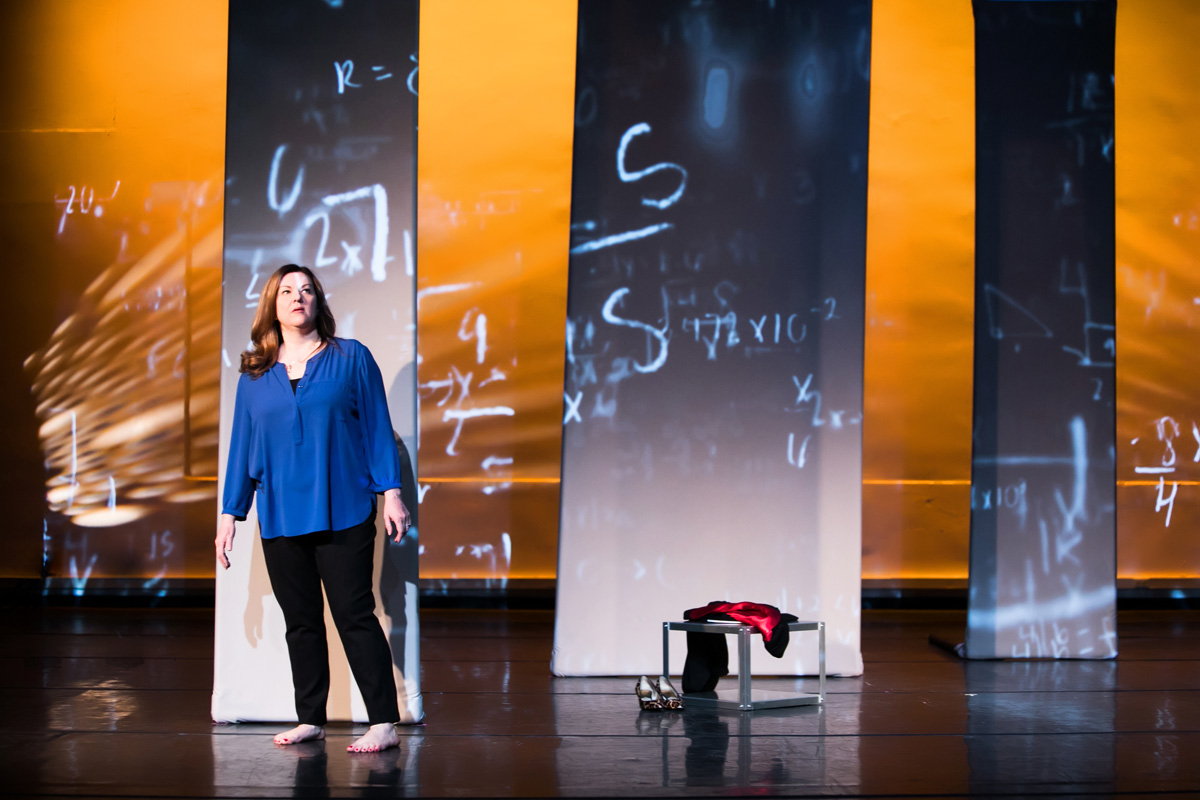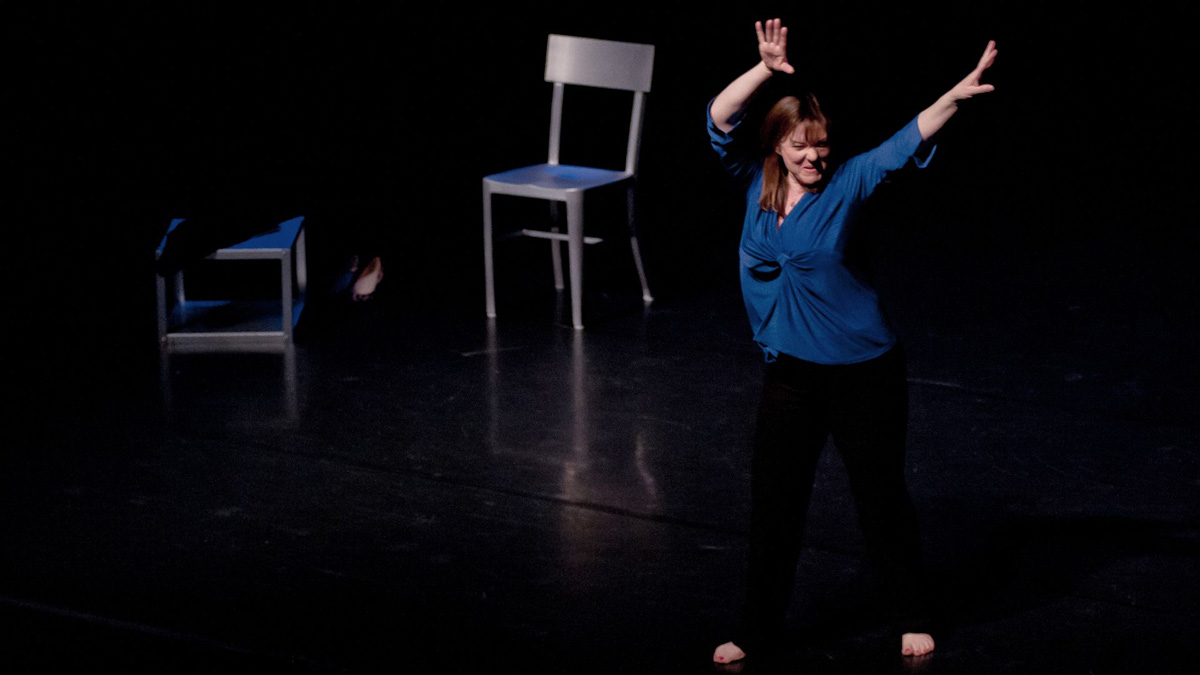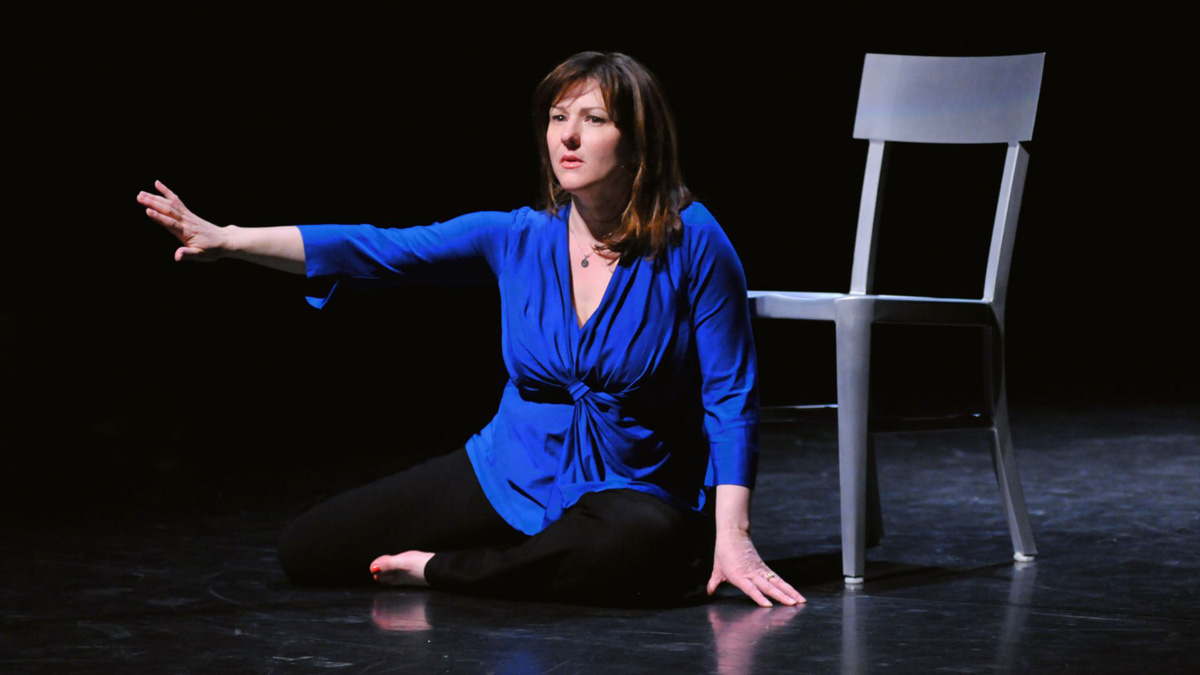Since 2009, Gioia De Cari has performed her one-woman show Truth Values in more than 50 theatres around the United States. In September, she brings her show to Canada for the first time, including shows at U of T’s Erindale Studio Theatre and Hart House Theatre. De Cari is a multitalented artist and "recovering mathematician" who has made significant contributions in theatre and classical music through her focus on the synergy between science and the arts.
In 1989, Gioia De Cari was on the path to a PhD in mathematics at prestigious MIT, with hopes of becoming a professor. Fast forward to today, and De Cari instead channels her experiences at MIT in Truth Values — an award-winning play that brings more than 30 characters to life. In the 75-minute solo show, De Cari delves into the challenges women face in male-dominated STEM fields (Science, Technology, Engineering, Mathematics) with humour, insight and compassion.
After the performance at Hart House Theatre, a panel discussion will explore issues of diversity, inclusion and unconscious bias in STEM fields. Moderater Maydianne Andrade (Professor, Department of Biological Sciences and founder of the Toronto Initiative for Diversity & Excellence) joins panelists Gioia De Cari, Sarah Mayes-Tang (Professor, Department of Mathematics), Kelly Lyons (Professor, Faculty of Information and Department of Computer Science) and Reila Zheng (graduate student, Department of Mathematics). The Erindale Studio Theatre performance will be followed by a Q&A session with Gioia De Cari.
Organizers Shubhangi Saraf (Associate Professor, Department of Mathematics) and Faith Ellen (Professor, Department of Computer Science) originally wanted to bring the play to the U of T for DCSWomen, started 30 years ago as a support group for female graduate students, postdocs, and faculty in the Department of Computer Science in the Faculty of Arts & Science.
“We felt it would be great to use the historical perspective provided by the play to highlight the importance of this group to our department. Many departments across campus have started Equity, Diversity, and Inclusion committees. We hope that the play will create better awareness about the kinds of biases that some members of their communities face and encourage them to create a more supportive and inclusive atmosphere within their departments.”

In logic and math, a truth value is one of the two values, "true" or "false". De Cari, who trained in multiple truth-value logic, offers a link between the term and her play. “When I was in mathematics long ago, I was interested in this kind of logic that played with the idea of multiple truth values — instead of just true and false as values, what if we added ‘maybe’, or an entire spectrum of values between? Later, as I was writing the play, this resonated with my experience of being at MIT. It’s a great metaphor for the play — that messy place in the middle with many shades of gray, nothing was black and white”.
De Cari’s experiences at MIT left her feeling alone and thinking that it was her fault things didn't go well. When she left MIT, she eventually focused on the arts. She had always been a performer, actor, and singer, but after MIT, she decided to try her hand at writing. De Cari says “these stories about being in math at MIT were really good exercises to become a better writer. I had no intention of using them. Around 2005, I was in several writing workshops in New York and one of them assigned me to write an autobiographical piece. I was so busy, I just grabbed that piece about MIT from these writings, thinking it was nothing interesting, but when I read it, others in the class said, ‘you have got to share this’.”
Some in her class also asked De Cari if she’d seen the news about then Harvard President Larry Summers' January 2005 speech about women and science, when he stated that one reason few women hold top positions in science may be "issues of intrinsic aptitude." She hadn’t, but when she read the news, she was as offended as many of the women were who were in the audience during his speech. “A huge firestorm happened around that speech, and it definitely lit the match for me to finish the play and make it public. It was really a life-changing thing for me. In fact, at the around the time I premiered the play in a regional theatre, I think someone wrote in an article about me that Larry Summers was my muse!”
When De Cari was writing about her experiences at MIT, she says “I thought about how I can treat this, because I really don't want to blame anyone. I look back at it as a time when things kind of went wrong in a lot of ways, but I felt like everyone was doing their best even though their best was not at all good sometimes, and that included me. That was really the only way I could write — with a lot of compassion — and so I guess I think if we're calling people out then let's do it with compassion.”

After so many years of performing Truth Values, has De Cari noticed changes in the composition of her audience? “I can say that we didn't expect the kind of audiences we would have. When I created the play, the expectation was that we'd have mostly women, but actually, the audiences have been mixed. It’s a wonderful thing, especially when the play has been presented in these educational contexts, because often the folks presenting it, they want to have the play as an event around equity, diversity and inclusion in STEM and particularly for women, who are still underrepresented, and they're so happy to have something that attracts more of a mixed audience than all women.”
In 2018, de Cari and Dr. Silvia Mazzula, a specialist in equity, diversity and inclusion, and Associate Professor of Psychology at CUNY, won a grant from the Alfred P. Sloan Foundation to create an educational discussion framework to go with the play. “We made some guidance points for how to do that kind of a talk back after the show. We wanted to create something that would be very helpful to presenters who wanted to do the show in an educational context and have a certain kind of outcome and a really insightful, lively engaging discussion about equity, diversity and inclusion in STEM.” The program launched in 2018 at Columbia in New York and travelled to MIT in 2019.
The original grant program included the play, the specially designed after show discussion, and a half-day mini conference the next day for students and mentors to talk about the issues raised in the play. Although people would be encouraged to stay in touch over social media, the program was designed to be mainly in person. Then the pandemic forced De Cari to decide whether to stop or to continue the program in another way. “Do I just end this project that ate my life or is there a way that it could live on in a more pandemic free place? I decided to morph it into something online, to see if I could nurture an online community. So that's what it is at this point. It's an online community for anyone interested, and it's free. The website has resources about STEM and diversity, as well as some information about our previous speakers, and we’ve had some community events I curated and hosted. Everyone's welcome to join.”
During the pandemic, De Cari won some seed money to explore making a hybrid documentary/performance film and also started working on a companion memoir. “It's been a fascinating project to write and in it I can incorporate these 80-some discussions we've had after the play, perhaps with interviews, and also with some of the key people I met along the way about some of the topics that came up.”
What advice would de Cari give to women and minorities who want to pursue an education in STEM? “I'll speak to the graduate students: I think the main thing, based on my experience, is that it's very important to make sure that you have good choices for someone to work with you on your thesis, maybe more than one good choice. I had an unexpectedly rough time with that. I would also say, even more important than the institution you choose to go to, find interesting people you choose to work with or who you may have the opportunity to work with, and who would be interested in working with you.” Saraf and Ellen’s advice? “Follow your intellectual passions but make time to support your fellow students and get support from them. It’s important to share your achievements, as well as your difficulties and anxieties, with other people who are going through similar experiences. It’s also really valuable to have good mentors who will act as guides for you.”

STEM programs would benefit from encouraging students to take humanities courses to get a more balanced worldview around gender/diversity/equality and to develop communication, cultural understanding, and collaboration skills. De Cari says “When I was at MIT, I was one of very few women in the PhD program and it was not turning out like I expected. I was kind of taken aback, utterly surprised, by the sexism. I took an undergraduate women's studies class even though I was a grad student in math, and that was so enlightening, so helpful, and I would encourage that. It was so illuminating for me at the time. I hadn't had that kind of education as an undergraduate and I should have.” Saraf and Ellen agree about the value of humanities in STEM. “This play is such an amazing example of how the humanities can spread awareness about issues in STEM fields and bring together communities of people with shared experiences. It would be great to have more such initiatives.”
When asked what they hope the Erindale Studio Theatre and Hart House Theatre audiences take away from the performances, Saraf and Ellen hope people will “appreciate how hard it was for women to succeed in mathematics (and more generally in STEM) and what barriers still exist for women and other underrepresented groups.” As for De Cari, she says “my aim as an artist is to stir the soul, and if I've stirred their soul with some art and some beauty and some good storytelling then that's my goal. I didn't intend the play to be educational and I didn't come in with an agenda. I do often find with educational presentations, that the goal is to use the play as a way to spark a fresh perspective on things that still persist regarding bias. I would hope it does that.”
The Jackman Humanities Institute is giving away two pairs of tickets to the Hart House Theatre presentation of Truth Values! For a chance to win a pair of tickets, fill out an entry form.
Gioia De Cari will perform Truth Values at the Erindale Studio Theatre Tuesday, September 20, 2022 and at Hart House Theatre Thursday, September 22, 2022. Show time for both venues is 7:30 pm. Tickets: Adults $25, Seniors $20, Students $15. More information: Hart House Theatre.
Sponsors: Jackman Humanities Institute, Computer Science (UTSG), Mathematics (UTSG), Mathematical & Computational Sciences (UTM), Chemical & Physical Sciences (UTM) and the Fields Institute.

